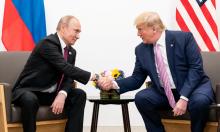Xenophobia gathers steam in Europe inciting ethnic conflicts
Neo-Nazis are not going to sit on their hands and wait in vain
The recent murder of the Dutch film director Theo Van Gogh, who made a controversial film about Islamic culture, entailed an outburst of violence in the Netherlands. Several mosques and churches were burnt, the police conducted several large operations against extremists; politicians started talking about the need to toughen the immigration law. 
It becomes obvious after such events that any state, even a superliberal one, may face ethnic conflicts at any moment. The recent example in the Netherlands can be an emphatic example of it.
The situation in Germany can hardly be called favorable at this point too. Rightist radical groups, spokespeople of which have recently won the parliamentary elections in Sachsen and Brandenburg states, are gathering steam in Germany. One should probably not exaggerate the success of the rightist forces yet. Several politicians and experts share this point of view: they believe that right forces can be dangerous only in case of the economic setback in the nation or considerable changes in the political structure. Neo-Nazis, however, are not going to sit on their hands and wait in vain.
The German newspaper Berliner Zeitung reported that far-right parties were conducting active preparations for the coming elections to the national parliament, Bundestag. The National and Democratic Party of Germany has already come to terms with the German People's Union for this purpose. In addition, the party is currently in talks with other far-right associations - the German social union and the German Party. It is noteworthy that those two organizations, as well as another far-right party, the Republicans (the largest rightist group), refused to join the Bundestag-2006 coalition in the beginning of November. As it turned out later, the decision was not final.
The Republicans' administration takes a much tougher stance: the leaders of this party do not hurry to welcome the coalition with other organizations. However, the Berliner Zeitung wrote, members of the party find such position quite embarrassing, for they want to have a closer cooperation with other far-right groups. That is why, spokespeople for the National Democratic Party radiate with optimism, when they talks about the future of the coalition.
Both German political forces and special services are aware of the importance of the situation. Law-enforcement agencies, however, do not have any energy to fight with far-rightist forces: they are too busy with the struggle against Islamic terrorism. The scandal with unsuccessful efforts to ban the National Democratic Party of Germany did not bring any good to the German authorities. The German government, however, can be happy with the fact that German far-right forces do not have such a charismatic leader as xenophobic Austrian national Jorg Haider.
Subscribe to Pravda.Ru Telegram channel, Facebook, RSS!




